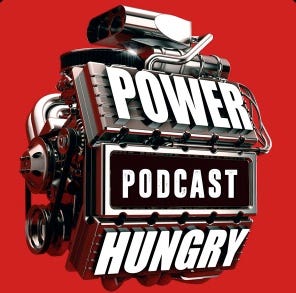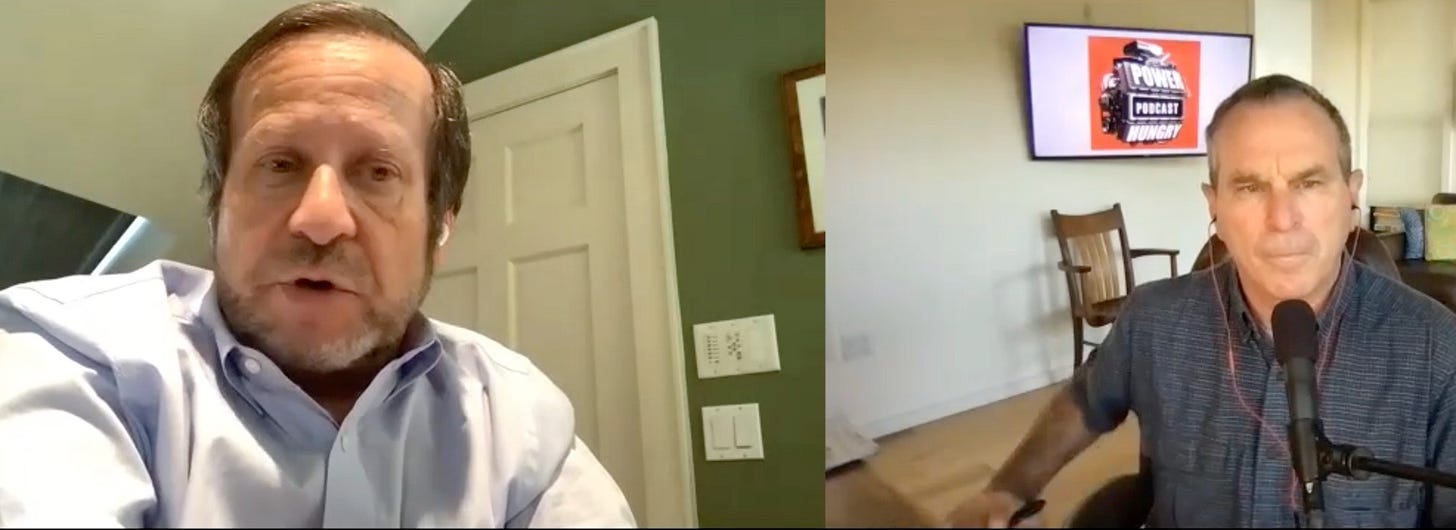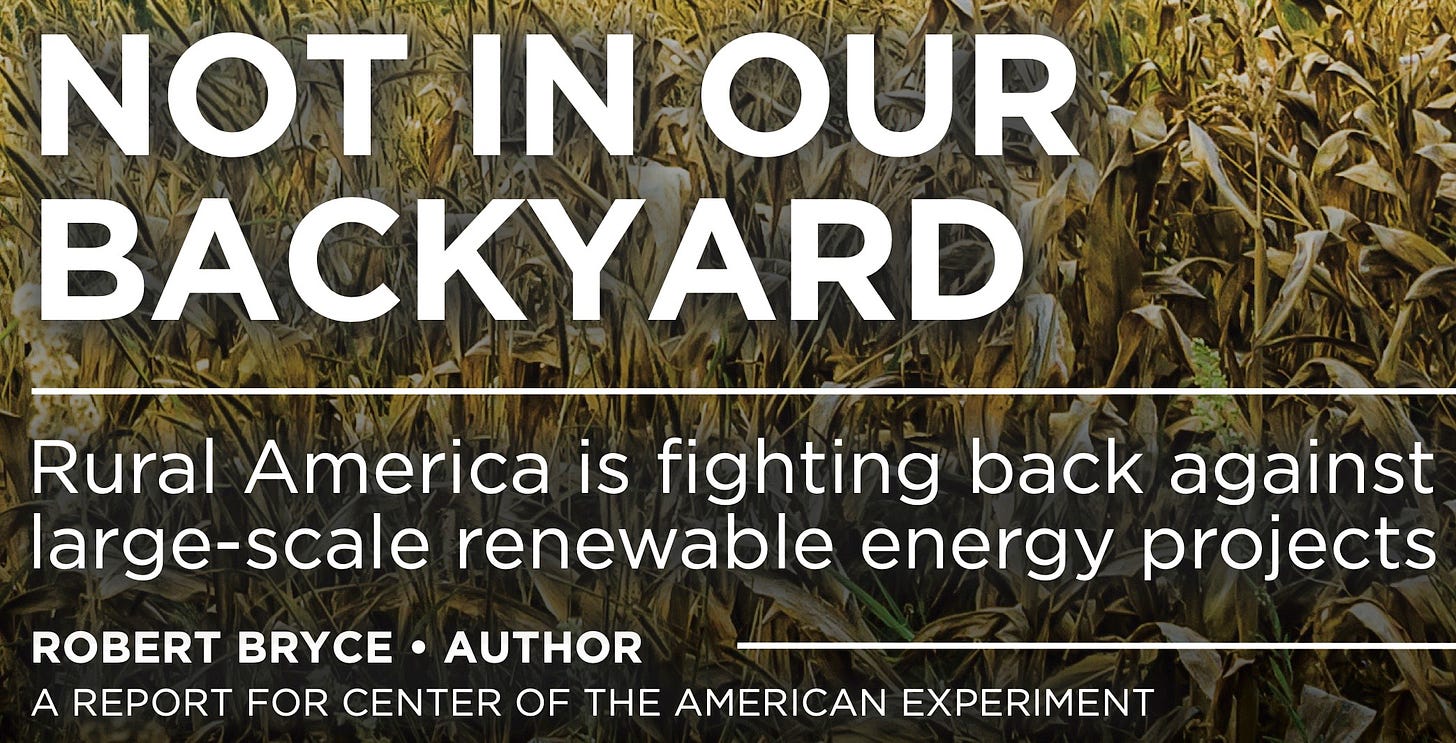Koonin on Unsettled, podcasts galore, our Carolina Wren den
Koonin: no to "crash decarbonization," I'm a guest on two podcasts, article recommendations, another "chime" of wrens on the porch
Our home-improvement projects are continuing, which means I have not been able to write as much this week as I had hoped. The trips to Home Depot along with family duties and podcast recordings have kept me busy. I will publish several articles over the next few days and am excited about the upcoming podcast episodes. I’ve also been pleased with the rain we’ve been getting. Since the blizzard smacked us in February, we’ve had very little rain. But over the past week, hard rains have filled the creek and boosted the wildflowers. That boost has given me another excuse not to mow the front yard as a bunch of Indian blankets popped up. (I took the photo at the top of the page this morning). I just learned that Indian blanket (Gaillardia pulchella) are also known as Firewheel which is a pretty cool name.
Four items today:
Steve Kooning talks about his new book, Unsettled on the Power Hungry Podcast
I’m on podcasts with Hayward and Burnett
Great articles by Penney and Grossman
Our south-facing porch is a Carolina Wren den
Reminder about Not In Our Backyard report


Steve Koonin on the podcast
Steven Koonin is a theoretical physicist who has had a long career in academia, business, and government. In this week’s episode of the Power Hungry Podcast, I talked to Koonin about his new book, Unsettled: What Climate Science Tells Us, What it Doesn’t, and Why It Matters, and why he believes efforts to limit debate about climate science are “pernicious.” He told me that “almost everything that’s in the book is right out of the assessment reports, or the quality peer-reviewed literature. And so I think it’s very hard for somebody to call me a denier. Because in fact, I’m quoting the official science, it’s just that these things never get surfaced.”
I also asked him about the “denier” label, which in the book he calls “abhorrent.” He replied: “I’m Jewish, my parents were born in this country. My grandparents emigrated from middle Europe...And on my mother’s side, my grandmother and her generation, 200 of the extended family perished in the camps and all the turmoil during World War II. I remember meeting, as a younger child, relatives who had the tattoo from the camps on their arms. And so it was not a direct experience for me. But it’s certainly part of the family DNA if you like. And so when somebody says “denier” that, you know, I would use the word “micro-aggression” or “macro-aggression” if I were two generations younger than I am. You know, it hurts a bit, and just stop that kind of namecalling. Alright? Let’s just talk about the science. But it’s very hard to get to that kind of conversation.”
We also discussed the rampant energy poverty and the fact that some 3 billion people on the planet are still using less electricity than an average American refrigerator. I asked, about the moral issues related to efforts that would deny the energy poor from using more hydrocarbons. He replied “you could, if you want to be nasty, you can say this is neocolonialism. ‘Keep them in the dark at the expense of allegedly saving the planet.’ And I think that is immoral...it is the fundamental question for those who are advocating global reductions in emissions: ‘who is going to pay the developing world not to emit?’ And as I say, in the book, I’ve been asking that question for 20 years, and nobody’s got a good answer.”
Koonin’s conclusion in his book is that we are not facing a climate catastrophe. Therefore, he told me, “what we need is slow, steady pressure on the system, not crash decarbonization.” It was a fun and interesting conversation. I invite you to listen to it and share it: powerhungrypodcast.com
I was on two podcasts
On Thursday afternoon, I had a fun conversation with my pal, Steve Hayward for his Powerline podcast. We reminisced about the fun time we had back in 2011 when we teamed up for an Intelligence Squared debate on the caption “Clean energy can drive America’s economic recovery.” We happily recalled that we won that debate by a big margin. If you are interested, you can watch the debate on YouTube. During the debate, I used a line that is still relevant today: “Clean energy is not a specific thing, it is a marketing slogan.”
During the podcast, Steve and I talked at length about the shameful closure of Indian Point, the murderous impact wind turbines are having on bat populations, the future of the electric grid, and my recent “Not in Our Backyard.” Steve is one of my favorite people. He’s funny and smart. He’s also finishing a biography of the conservative editor, commentator, and writer M. Stanton Evans, which will be published later this year. You can listen to the podcast here.
I was also on the Heartland Institute’s podcast this week with H. Sterling Burnett. If you haven’t followed Sterling, he does some very good writing about energy and climate issues. I was flattered that Sterling wanted to talk about my fourth book, Power Hungry: The Myths of “Green” Energy and the Real Fuels of the Future. We talked about what has changed, and what hasn’t, since the book was published back in 2010. As I told him, the four imperative – power density, energy density, cost, and scale – still rule our energy and power systems. We also discussed the “Not in Our Backyard” report as well as the closure of Indian Point, climate politics, and more. You can tune in here.
Outstanding articles by Emmett Penney and Peter Grossman
I like to promote articles by other writers, and in particular, I like to promote articles that I wish I’d written. Here are two from this week:
Emmett Penney wrote a powerful piece for the American Conservative on nuclear energy. He called nuclear power plants are "our industrial cathedrals.” It’s a great line and one with which I fully agree. He also wrote, "There is no such thing as a wealthy society with a weak electrical grid. As nuclear plants are forced to close, our grid grows more fragile.” Amen.
My friend, Peter Grossman, had a sharp piece in Inside Sources titled “President Biden’s Fantastical Climate Policy.” He wrote, “The belief that if the U.S. acts & ...the rest of the world will follow is wishful thinking. What incentive does any developing country have to adopt an unreliable electric system?” If you haven’t seen it, Peter’s book, U.S. Energy Policy and the Pursuit of Failure, published in 2013, remains relevant today. As Peter writes in his Inside Sources piece, the Biden administration’s plans are doomed to failure. Peter also writes about the human issues at stake. “For the poorest nations of Africa and Asia, the goal should be to raise the standard of living and develop institutions that encourage investment and discourage corruption. That means for starters they should not cripple their economies by opting for intermittent and weather-dependent renewable energy systems that are expensive to operate and difficult to control. Reliable electricity is the most crucial technological requirement for a modern economy. Coal-fired electric generation is far easier to manage than one based on wind and solar and would advance development much farther and more quickly.” Amen to that, too.

Our south porch is a Carolina Wren den
On Wednesday morning at about 9:15, when I took the picture above, a chime of five baby Carolina Wrens were in a nest on the top shelf on our south-facing porch. By Thursday afternoon, they were all gone.
Over the 21 years that we’ve lived in our home in central Austin, we have seen lots of wildlife. Our home’s proximity to Barton Creek, as well as the heavy woods, bird feeders, bird baths, and our laissez faire attitude toward mowing, (and yard trimming in general) seems to attract critters. We’ve had visits from armadillos, foxes, coyotes, tarantulas, and even a bobcat. Birds seem to be particularly happy to hang around. This morning, we had a brief visit from a Baltimore Oriole, which landed on a hummingbird feeder, took a quick survey and quickly departed. It's only the second time I’ve seen one in our yard.
But of all the (non-human) species that frequent our place, Carolina Wrens (Thryothorus ludovicianus) seems to feel the most at home. Indeed, they have made a habit of turning our south-facing covered porch into a breeding ground. Over the two decades we’ve lived in this place, we’ve seen maybe eight or 10 pairs of Carolina Wrens make nests on the porch. We’ve tracked them as they lay and incubate their eggs. And after about two weeks, we have seen the eggs turn into baby birds that fly clumsily out of the nest to navigate the world. Over the years, the Wrens have used different parts of the porch for their baby making. One pair used an under-used bicycle helmet. Another year, they nested in one of Mary’s hiking boots. This year, they nested on a high shelf on the west side of the porch between another underused bicycle helmet and some other cycling detritus that was relegated to the top shelf.
The National Audubon Society’s website describes the Carolina Wren thusly: “common in open woods and backyards in the southeast. There they busily explore brushpiles and low tangles. The adults live in pairs all year, and they may "duet" at any season, with the female giving a chattering note while the male sings.”
Over the past two weeks, both male and female wrens were constantly shuttling back and forth between the top-shelf nest and the woods to the south, east, and west of the nest. Coming out of the porch door we would often startle the parent birds and see them dart to a close-by perch to keep a lookout or on their way to forage for more food. I haven’t seen any of the baby Wrens around the yard since they fled the nest. But I have a feeling that some of them will return to our south porch.
Have a great weekend.
Want to help?
1. Share this email to your friends and colleagues! Or have them email me so I can add them to my distribution list.
2. Subscribe to the Power Hungry Podcast.
3. Rent or buy Juice on iTunes or Amazon Prime.
4. Buy A Question of Power: Electricity and the Wealth of Nations and give it a positive review.
5. Follow me and Juice on Twitter.
6. Need a speaker for your conference, class, or webinar? Ping me!
Thanks!

A reminder to share this report
I have been pleased with the response to my recent report about land-use conflicts and renewables. "Not In Our Backyard," was published on April 21 by the Center of the American Experiment. The center is also the home of the Renewable Energy Rejection Database, which includes details on the roughly 300 times that local or regional governments have rejected or restricted wind-energy projects. Please share both of them. As I said last week, the only way to bring sanity to the decisions being made by policymakers is to relentlessly pound the facts. Here's a link to the full report. Please share it.
Reminder: You can watch Juice for free on Roku!
If you haven't seen our documentary yet, here's a reminder: you can watch Juice: How Electricity Explains the World, on Roku, for free. Just click this link. If your friends haven't seen it, send them a link. Or if you have a prime membership, you can watch it on Amazon Prime.



